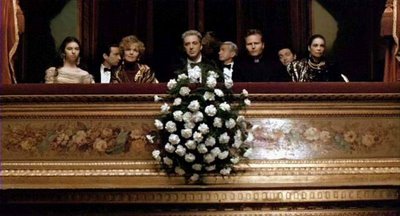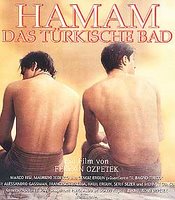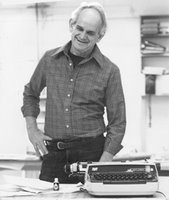Keith Uhlich
 It is my hope that this "5 for the Day" doesn't just elicit commentary from the professionals. Certainly the writings described below are significant touchstones in my own development as a critic, but the reason I return to them time and again, in both memory and actuality, is that they all had (and continue to have) a profound effect on my ways of thinking and of being. To an extent, these pieces confirmed things I already felt yet was unable to express (half-formed ideas--seeded who knows where, when, or how--achieving full bloom), but these moments of clarity were never comforting. True epiphanies don't allow us to settle back into our preconceptions and prejudices, but propel us forward, a little wiser and a little more aware that, in life, we're often falling through the air without a net. Today, I’m happy to be able to claim several of the authors of these pieces as friends, though at the time of initial publication they were only words on a page. It speaks well of them and of the longevity of their work that a fully-formed personality shined through the text, engaging in conversation (if only between the lines) with a young reader in search of his own voice and of the best ways in which to use it.
It is my hope that this "5 for the Day" doesn't just elicit commentary from the professionals. Certainly the writings described below are significant touchstones in my own development as a critic, but the reason I return to them time and again, in both memory and actuality, is that they all had (and continue to have) a profound effect on my ways of thinking and of being. To an extent, these pieces confirmed things I already felt yet was unable to express (half-formed ideas--seeded who knows where, when, or how--achieving full bloom), but these moments of clarity were never comforting. True epiphanies don't allow us to settle back into our preconceptions and prejudices, but propel us forward, a little wiser and a little more aware that, in life, we're often falling through the air without a net. Today, I’m happy to be able to claim several of the authors of these pieces as friends, though at the time of initial publication they were only words on a page. It speaks well of them and of the longevity of their work that a fully-formed personality shined through the text, engaging in conversation (if only between the lines) with a young reader in search of his own voice and of the best ways in which to use it.1. Owen Gleiberman on The Godfather, Part III:
 The reaction to the third film in the Godfather series was particularly stinging to my thirteen-year-old eyes and ears, and not just because I was enamored (and still am) of Francis Ford Coppola's elegiac, self-proclaimed "coda." My tastes had diverged with the consensus before, but this was the first time I recognized how criticism, at its basest, becomes cruelty. Most of the bile was directed, of course, at the "amateurish" performance of Sofia Coppola (a malice currently perpetuated in a good number of the reviews for her underrated and misunderstood biopic Marie Antoinette), but there was a concurrent sense of mock-proletarian outrage for how Francis Ford Coppola recast his amoral gangster epic in a redemptive mold. I recall discovering Owen Gleiberman's against-the-tide Entertainment Weekly review (Grade: A) in a supermarket checkout line. It was the first piece of his that I read and it made me an EW subscriber (and Gleiberman acolyte/imitator) for a good many years to come. It wasn't just the way he strung words together into vivid descriptors that I would endlessly attempt to duplicate (Part III is, in Gleiberman’s purview, a "flawed, spellbinding, end-of-a-dynasty epic"), but how his prose stylizations possessed a weight and purpose--a seriousness--that I failed to find in any other analysis of Coppola's film. A favorite passage:
The reaction to the third film in the Godfather series was particularly stinging to my thirteen-year-old eyes and ears, and not just because I was enamored (and still am) of Francis Ford Coppola's elegiac, self-proclaimed "coda." My tastes had diverged with the consensus before, but this was the first time I recognized how criticism, at its basest, becomes cruelty. Most of the bile was directed, of course, at the "amateurish" performance of Sofia Coppola (a malice currently perpetuated in a good number of the reviews for her underrated and misunderstood biopic Marie Antoinette), but there was a concurrent sense of mock-proletarian outrage for how Francis Ford Coppola recast his amoral gangster epic in a redemptive mold. I recall discovering Owen Gleiberman's against-the-tide Entertainment Weekly review (Grade: A) in a supermarket checkout line. It was the first piece of his that I read and it made me an EW subscriber (and Gleiberman acolyte/imitator) for a good many years to come. It wasn't just the way he strung words together into vivid descriptors that I would endlessly attempt to duplicate (Part III is, in Gleiberman’s purview, a "flawed, spellbinding, end-of-a-dynasty epic"), but how his prose stylizations possessed a weight and purpose--a seriousness--that I failed to find in any other analysis of Coppola's film. A favorite passage:"Coppola and coscreenwriter Mario Puzo have concocted a densely packed narrative that builds very slowly. The movie, however, is more than the sum of its mazelike convolutions. For Coppola is telling a story of emotional incest: He shows us a family strangled by its own blood ties."
I've distanced myself from Gleiberman of late (the final straw: his consistent disdain for and childish dismissal of De Palma), but I can’t deny (and am thankful for) the influence he had on me at an intensely formative time in my life.
*Click here to read Gleiberman's review in full. Originally published in Entertainment Weekly, 1/11/1991.
2. Pauline Kael and Matt Zoller Seitz on the Star Wars trilogy:
 I wonder if every American child born in 1977 carries with them the subconscious stigma of Star Wars. I've had a long-term love/hate relationship with George Lucas' behemoths: the first video I ever rented was Return of the Jedi and it began an unconditional love affair with the original trilogy that came to a screeching halt when, while making my way through what Matt Groening aptly described as "the deepest pit in Hell" (i.e. middle school), I first read Pauline Kael's harsh critiques of the series' opening and closing installments (somehow I missed out on her favorable analysis of The Empire Strikes Back--it would have alleviated a good many sleepless nights). From that point forward, there was a constant argument in my head: Every time I'd quote my favorite lines to the ether ("But I was going into Toshi station to pick up some power converters!"; "You will bring Captain Solo and the Wookie to me!"; "I have FELT him, my master!"), Ms. Kael would appear, growling like the Rancor ("For young audiences [Star Wars is] like getting a box of Cracker Jacks that is all prizes."; "But I can't believe that Jedi will give kids any deep pleasure, because there's no quality of personal obsession in it, or even of devotion to craft."; "It's an epic without a dream."). I saw her points then and I still do now, but her dissent would never fully resonate until it met its antithetical complement, which appeared during my middle years of college, courtesy the creator of this site.
I wonder if every American child born in 1977 carries with them the subconscious stigma of Star Wars. I've had a long-term love/hate relationship with George Lucas' behemoths: the first video I ever rented was Return of the Jedi and it began an unconditional love affair with the original trilogy that came to a screeching halt when, while making my way through what Matt Groening aptly described as "the deepest pit in Hell" (i.e. middle school), I first read Pauline Kael's harsh critiques of the series' opening and closing installments (somehow I missed out on her favorable analysis of The Empire Strikes Back--it would have alleviated a good many sleepless nights). From that point forward, there was a constant argument in my head: Every time I'd quote my favorite lines to the ether ("But I was going into Toshi station to pick up some power converters!"; "You will bring Captain Solo and the Wookie to me!"; "I have FELT him, my master!"), Ms. Kael would appear, growling like the Rancor ("For young audiences [Star Wars is] like getting a box of Cracker Jacks that is all prizes."; "But I can't believe that Jedi will give kids any deep pleasure, because there's no quality of personal obsession in it, or even of devotion to craft."; "It's an epic without a dream."). I saw her points then and I still do now, but her dissent would never fully resonate until it met its antithetical complement, which appeared during my middle years of college, courtesy the creator of this site. Matt's a Star Wars kid, too, though being a few years older, he was able to absorb it consciously. (By the time I got around to it, the trilogy had had its first run in theaters and was well on the way to becoming a video staple.) In this way, he was the perfect representative (a Jedi knight in flowing robes) to reclaim the trilogy for a generation that had been so consistently lambasted by its elders. I no longer have the specific piece in my possession that he wrote for New York Press circa 1997 (in anticipation of the trilogy's twenty-year anniversary and re-release), but I remember a good number of the particulars, especially the lengthy opening anecdote detailing how a thirteen-year-old acquaintance's spoiler-heavy comments about Jedi drove Matt to fisticuffs, not to mention the essay's terrific, forward-looking closer ("I'll be the one booing when Chewbacca doesn't get a medal."). The most important thing for me in this piece was that Matt never stumbled in proclaiming his love for Star Wars; his confidence never wavered, despite the chants to the contrary by the barbarians at his gate. Matt's piece didn’t exactly give me the ability to love Star Wars as unconditionally as I had, but it did help, immeasurably, in balancing out the violently varying opinions in my head.
Matt's a Star Wars kid, too, though being a few years older, he was able to absorb it consciously. (By the time I got around to it, the trilogy had had its first run in theaters and was well on the way to becoming a video staple.) In this way, he was the perfect representative (a Jedi knight in flowing robes) to reclaim the trilogy for a generation that had been so consistently lambasted by its elders. I no longer have the specific piece in my possession that he wrote for New York Press circa 1997 (in anticipation of the trilogy's twenty-year anniversary and re-release), but I remember a good number of the particulars, especially the lengthy opening anecdote detailing how a thirteen-year-old acquaintance's spoiler-heavy comments about Jedi drove Matt to fisticuffs, not to mention the essay's terrific, forward-looking closer ("I'll be the one booing when Chewbacca doesn't get a medal."). The most important thing for me in this piece was that Matt never stumbled in proclaiming his love for Star Wars; his confidence never wavered, despite the chants to the contrary by the barbarians at his gate. Matt's piece didn’t exactly give me the ability to love Star Wars as unconditionally as I had, but it did help, immeasurably, in balancing out the violently varying opinions in my head.*Versions of Kael's commentary appear in The New Yorker magazine (dates for Star Wars and The Empire Strikes Back reviews: Unknown; date for Return of the Jedi review: 5/30/1983), 5001 Nights at the Movies, and Taking It All In. Seitz's article published in New York Press, May, 1997.
3. Godfrey Cheshire on Steam:
 Godfrey Cheshire's New York Press review of the Turkish film Steam came to me at a time when I was questioning my sexual preferences. I distrusted any specific group that proclaimed there was a singular rule of attraction and the review expressed for me what I only knew intuitively and could never state with any clarity. Despite my eventual identification as Queer, I don't pretend that to be an incontrovertible descriptor, and I have Cheshire's review (one that he later bemusedly admitted was a toss-off) to thank for that. It is probably the most yellowed and read article in my scrapbook. I underlined certain passages from it and think it only appropriate to reprint them here:
Godfrey Cheshire's New York Press review of the Turkish film Steam came to me at a time when I was questioning my sexual preferences. I distrusted any specific group that proclaimed there was a singular rule of attraction and the review expressed for me what I only knew intuitively and could never state with any clarity. Despite my eventual identification as Queer, I don't pretend that to be an incontrovertible descriptor, and I have Cheshire's review (one that he later bemusedly admitted was a toss-off) to thank for that. It is probably the most yellowed and read article in my scrapbook. I underlined certain passages from it and think it only appropriate to reprint them here:"… there’s the subtler suggestion that the desire dealt with [in Steam] doesn’t appear straight-on and clear-cut, but elusively, diaphonously, as if through a mist of possibility."*Originally published in New York Press, circa 1998, exact date and issue unknown.
"American gay films believe in homo and hetero as very distinct categories of being; they also believe they know the markedly different ways that gays and straights look, act, talk, joke, decorate, desire and relate to screen images of sexuality… The continental gay film, on the other hand, smudges the boundaries that its American counterpart specializes in scrupulously respecting."
"Europeans… don’t seem to grasp our commodofied, Berlin Wall view of sexuality. They make films in which "gay" and "straight" describe what people do, not what they intrinsically are. Such movies assume that there are no immutable categories, that people change as the situations around them do, and that variety is the spice of life.""Bisexuality is as natural to [Steam] as pasta to a trattoria… it seems innocent of the ideologies of sex, which in the U.S. morph people into self-identified types as surely as gym regimens mold physiques… you don't have to be Robert Graves to see that this is a huge esthetic improvement over our prim, exclusionary notions of sexual "identity." Because of their thinness and rigidity, such ideas virtually dictate that American gay films, even the best, end up like Jeffrey or Billy’s Hollywood Screen Kiss: full of cartoonish types rather than complex individuals, punchlines rather than insights and unvarying comic flippancy instead of dramatic nuance and penetration."
4. Phillip Lopate: "Anticipation of La Notte: The "Heroic" Age of Moviegoing":
Phillip Lopate's reminiscence of his tumultuous days as a Columbia University student and budding cinephile remains one of the best pieces of autobiographical criticism I've ever read. As a college undergrad entertaining occasional thoughts of suicide, it was more than cathartic to read about Lopate's own failed attempt, which he contextualizes, retroactively, as an act of simultaneous purity and selfishness:
"Between screenings of [Jean] Vigo's L'Atalante and Zéro de Conduite at West 106th Street, I told my older brother that I was thinking of killing myself. Distressed, he counseled patience, but it was too late to listen. Vigo’s dream of a man and a woman drifting down the Seine in a houseboat, touching each other, seemed insultingly unreachable."
 He goes on to describe the attempt: twenty sleeping pills downed with a quart of Tropicana orange juice, suicide note with quotes from Paul Goodman and Freud ("I can laugh at it now."), and the undigestible dining hall beef stew that saved him ("it is that wretched institutional food I have to thank for being alive today."). Perhaps most appealing to me was the aftermath where, immediately upon his release from a psychiatric ward, Lopate and his brother "went straight downtown to see a double bill at the Bleecker Street Cinema: Grand Illusion and Paths of Glory… I had gotten suicide out of my system, but not cinema." Lopate's words effectively got suicide out of my system, and I credit his climactic recollection of his failed Antonioni-esque student film, Saint at the Crossroads, with setting me on a more decisive career path, far away from my own ill-advised attempts at filmmaking. As the writer wisely observes: "It [is] easier and cheaper to control pens and paper than actors."
He goes on to describe the attempt: twenty sleeping pills downed with a quart of Tropicana orange juice, suicide note with quotes from Paul Goodman and Freud ("I can laugh at it now."), and the undigestible dining hall beef stew that saved him ("it is that wretched institutional food I have to thank for being alive today."). Perhaps most appealing to me was the aftermath where, immediately upon his release from a psychiatric ward, Lopate and his brother "went straight downtown to see a double bill at the Bleecker Street Cinema: Grand Illusion and Paths of Glory… I had gotten suicide out of my system, but not cinema." Lopate's words effectively got suicide out of my system, and I credit his climactic recollection of his failed Antonioni-esque student film, Saint at the Crossroads, with setting me on a more decisive career path, far away from my own ill-advised attempts at filmmaking. As the writer wisely observes: "It [is] easier and cheaper to control pens and paper than actors."*Click here to read the essay in full. Originally published in American Film; reprinted in Totally, Tenderly, Tragically: Essays and Criticism from a Lifelong Love Affair with the Movies, Anchor Books/Doubleday, ©1992.
5. Manny Farber: Interviewed by Richard Thompson:
Manny Farber seems to speak as he writes (even if, by his own admittance, his text requires a significant amount of polishing). His and wife/collaborator Patricia Patterson's interview with Richard Thompson--reprinted in the essential Farber collection, Negative Space--contains a number of resonant observations, though the one that hit me deepest (and quite recently, at that) was as follows:
Q: "What is the role of evaluation in your critical work?"
A: "It's practically worthless for a critic. The last thing I want to know is whether you like it or not: the problems of writing are after that. I don’t think it has any importance; it's one of those derelict appendages of criticism. Criticism has nothing to do with hierarchies."
 As anyone who's read Farber can attest, his writing often contradicts this statement, but that gets at his genius. There's a constant sense of forward momentum and, more importantly, of development in his work. The words don't stagnate trying to fit ideological points that no longer mesh with the critic's consistently mutating mindset. Farber helped me to see the importance of re-evaluation, the necessity--though it requires a good deal of effort and toil--of reinventing the wheel with each new project, with each new observation. The seven critical precepts he and Patterson list at the end of the interview mark just one specific moment in an ever-evolving belief system and, if revisited today, would no doubt require significant reappraisal and overhaul, though the words might very well (embracing true contradiction) remain the same:
As anyone who's read Farber can attest, his writing often contradicts this statement, but that gets at his genius. There's a constant sense of forward momentum and, more importantly, of development in his work. The words don't stagnate trying to fit ideological points that no longer mesh with the critic's consistently mutating mindset. Farber helped me to see the importance of re-evaluation, the necessity--though it requires a good deal of effort and toil--of reinventing the wheel with each new project, with each new observation. The seven critical precepts he and Patterson list at the end of the interview mark just one specific moment in an ever-evolving belief system and, if revisited today, would no doubt require significant reappraisal and overhaul, though the words might very well (embracing true contradiction) remain the same:Our Critical Precepts
(1) "It's primarily about language, using the precise word for Oshima's eroticism, having a push-pull relationship with both film experience and writing experience."
(2) "Anonymity and coolness, which includes writing film-centered rather than self-centered criticism, distancing ourselves from the material and people involved. With few exceptions, we don't like meeting the movie director or going to press screenings."
(3) "Burrowing into the movie, which includes extending the piece, collaging a whole article with pace changes, multiple tones, getting different voices into it."
(4) "Not being precious about writing. Paying strict heed to syntax and yet playing around with words and grammar to get layers and continuation."
(5) "Willingness to put in a great deal of time and discomfort: long drives to see films again and again; nonstop writing sessions."
(6) "Getting the edge. For instance, using the people around you, a brain like Jean-Pierre Gorin's."
(7) "Giving the audience some uplift."
 *"Manny Farber and Patricia Patterson in Interview with Richard Thompson," reprinted in Negative Space: Manny Farber on the Movies, Expanded Edition, Da Capo Press, ©1998.
*"Manny Farber and Patricia Patterson in Interview with Richard Thompson," reprinted in Negative Space: Manny Farber on the Movies, Expanded Edition, Da Capo Press, ©1998._____________________________________________________
Keith Uhlich is managing editor of The House Next Door, a staff critic for Slant Magazine, and a contributor to a variety of print and online publications.

8 Comments:
Now I totally feel deprived. I was a GODFATHER III fan myself, but never got to see Gleiberman's review. (He'd been on my sh*tlist ever since his review of THE LAST EMPEROR, and I was a bit of a hard-liner back then.)
The precepts are the shit.
As much as I loved reading Pauline Kael during my "formative years," I often felt her shadow looming over me, especially if I found myself liking something I knew she despised. (How to reconcile my happiness at seeing Brewster McCloud with the knowledge that I knew she thought it was a fizzle?!)
Thanks, too, Keith, for stirring up my interest in seeing The Godfather Part III again. I still encounter people who aren't tired of trotting out the whole "if it just weren't for Sofia Coppola" nonsense, or the fact that Coppola fashioned the movie into a movie partially about himself. When, in the annals of personal, auteurist filmmaking, did this strategy become a crime? I still don't believe that The Godfather Part III is anywhere near the achievement the first two films are, but why does that mean it can only be considered a shameful failure? The truth is, it doesn't, and it isn't.
You know what? I've never seen G3 (ha!, sorry, silly little things these days make me weep with laughter...) all the way through. Maybe I shall. I think I've seen the whole movie but only in pieces. Up until a couple years ago my gf had never seen any of the series and now thinks, like so many, the first one is essential. I agree, actually: it's pretty perfect. Just don't need to see it ever again, probably, unlike the gf.
I told my friend, Sean, about the film criticism blogathon a couple weeks ago but he couldn't get his essay together so he posted this, which is totally relevant to Keith's list and this Godfather tangent. Let's just say Peter Griffin is one step above (or below? who knows) Michael Medved.
When was Farber interviewed? (prior to 1998 I assume) I like this list of rules.
The interview's dated year of my birth, 1977. :-)
Thanks Keith. I liked your post a lot.
Very welcome Harry. I had a good time composing it.
Post a Comment
<< Home